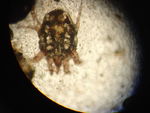Difference between revisions of "Psoroptes cuniculi"
| (4 intermediate revisions by one other user not shown) | |||
| Line 1: | Line 1: | ||
| − | {{ | + | {{OpenPagesTop}} |
| − | |||
{{Taxobox | {{Taxobox | ||
|name = Psoroptes | |name = Psoroptes | ||
| Line 14: | Line 13: | ||
|species = ''Psoroptes cuniculi | |species = ''Psoroptes cuniculi | ||
}} | }} | ||
| + | Also known as: '''''Ear canker mite | ||
| − | + | ==Introduction== | |
| − | |||
| − | |||
| − | |||
| − | |||
| − | |||
| − | |||
[[Image:Psoroptes cuniculi.jpg|150px|thumb|right|'''Psoroptes cuniculi (Sourced from Joel Mills, Wikimedia Commons) ''']] | [[Image:Psoroptes cuniculi.jpg|150px|thumb|right|'''Psoroptes cuniculi (Sourced from Joel Mills, Wikimedia Commons) ''']] | ||
| − | ''Psoroptes cuniculi'' is a [[:Category:Non-Burrowing Mites|non-burrowing parasite]], of the class ''Arachnida'' and is seen worldwide. It is found on the ears of the infected host and is generally seen in relatively small amounts. However, occasionally they will proliferate and the infection will become severe resulting in [[Psoroptic Mange|mange]]. | + | ''Psoroptes cuniculi'' is a [[:Category:Non-Burrowing Mites|non-burrowing parasite]], of the class ''Arachnida'' and is seen worldwide. It is found on the ears of the infected host and is generally seen in relatively small amounts. However, occasionally they will proliferate and the infection will become severe resulting in [[Psoroptic Mange|mange]]. In rabbits, they cause [[Mites – Rabbit#Psoroptiasis|Ear Canker]]. |
| − | + | Predilection site: '''Ears | |
| − | |||
| − | |||
| − | |||
| − | |||
==Hosts== | ==Hosts== | ||
| Line 36: | Line 26: | ||
==Identification== | ==Identification== | ||
| − | Adults mite grow up to around 0.75mm in length. The legs are long and jointed, bearing suckers on the ends. | + | Adults mite grow up to around 0.75mm in length. The legs are long and jointed, bearing suckers on the ends on pairs 1, 2, and 4 in the female and 1, 2, and 3 in the male. The adults also have very characteristic pointed mouthparts. |
It is highly likely that ''P. cuniculi'' is simply an adaptation of the species ''[[Psoroptes ovis]]''. | It is highly likely that ''P. cuniculi'' is simply an adaptation of the species ''[[Psoroptes ovis]]''. | ||
| Line 42: | Line 32: | ||
==Life Cycle== | ==Life Cycle== | ||
The egg hatches forming an hexapod larvae. The larvae then moults forming a protonymph, which further moults to form a tritonymph, which then moults to become an adult. Each stage takes around two days, totalling to an approximate 10 day life cycle. | The egg hatches forming an hexapod larvae. The larvae then moults forming a protonymph, which further moults to form a tritonymph, which then moults to become an adult. Each stage takes around two days, totalling to an approximate 10 day life cycle. | ||
| + | |||
| + | {{Learning | ||
| + | |literature search = [http://www.cabdirect.org/search.html?rowId=1&options1=AND&q1=%22Psoroptes+cuniculi%22&occuring1=title&rowId=2&options2=AND&q2=&occuring2=freetext&rowId=3&options3=AND&q3=&occuring3=freetext&x=56&y=10&publishedstart=yyyy&publishedend=yyyy&calendarInput=yyyy-mm-dd&la=any&it=any&show=all ''Psoroptes cuniculi'' publications] | ||
| + | |flashcards = [[Small Mammals Q&A 21]] | ||
| + | |Vetstream = [https://www.vetstream.com/canis/search?s=mite Mites] | ||
| + | }} | ||
| + | |||
| + | |||
| + | {{review}} | ||
| + | |||
| + | {{OpenPages}} | ||
[[Category:Non-Burrowing Mites]] | [[Category:Non-Burrowing Mites]] | ||
[[Category:Rabbit Parasites]] | [[Category:Rabbit Parasites]] | ||
| − | [[Category: | + | [[Category:Expert_Review - Exotics]] |
| − | |||
Latest revision as of 17:18, 4 June 2016
| Psoroptes | |
|---|---|
| Kingdom | Animalia |
| Phylum | Arthropoda |
| Class | Arachnida |
| Sub-class | Acari |
| Order | Sarcoptiformes |
| Family | Psoroptidae |
| Genus | Psoroptes |
| Species | Psoroptes cuniculi |
Also known as: Ear canker mite
Introduction
Psoroptes cuniculi is a non-burrowing parasite, of the class Arachnida and is seen worldwide. It is found on the ears of the infected host and is generally seen in relatively small amounts. However, occasionally they will proliferate and the infection will become severe resulting in mange. In rabbits, they cause Ear Canker.
Predilection site: Ears
Hosts
Commonly of rabbits, but also seen in goats, sheep and horses.
Identification
Adults mite grow up to around 0.75mm in length. The legs are long and jointed, bearing suckers on the ends on pairs 1, 2, and 4 in the female and 1, 2, and 3 in the male. The adults also have very characteristic pointed mouthparts.
It is highly likely that P. cuniculi is simply an adaptation of the species Psoroptes ovis.
Life Cycle
The egg hatches forming an hexapod larvae. The larvae then moults forming a protonymph, which further moults to form a tritonymph, which then moults to become an adult. Each stage takes around two days, totalling to an approximate 10 day life cycle.
| Psoroptes cuniculi Learning Resources | |
|---|---|
To reach the Vetstream content, please select |
Canis, Felis, Lapis or Equis |
 Test your knowledge using flashcard type questions |
Small Mammals Q&A 21 |
 Search for recent publications via CAB Abstract (CABI log in required) |
Psoroptes cuniculi publications |
| This article has been peer reviewed but is awaiting expert review. If you would like to help with this, please see more information about expert reviewing. |
Error in widget FBRecommend: unable to write file /var/www/wikivet.net/extensions/Widgets/compiled_templates/wrt69a4a5938bedb1_00685766 Error in widget google+: unable to write file /var/www/wikivet.net/extensions/Widgets/compiled_templates/wrt69a4a59393f5c8_52557240 Error in widget TwitterTweet: unable to write file /var/www/wikivet.net/extensions/Widgets/compiled_templates/wrt69a4a5939b7555_15178693
|
| WikiVet® Introduction - Help WikiVet - Report a Problem |
